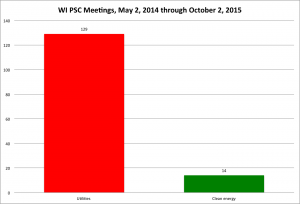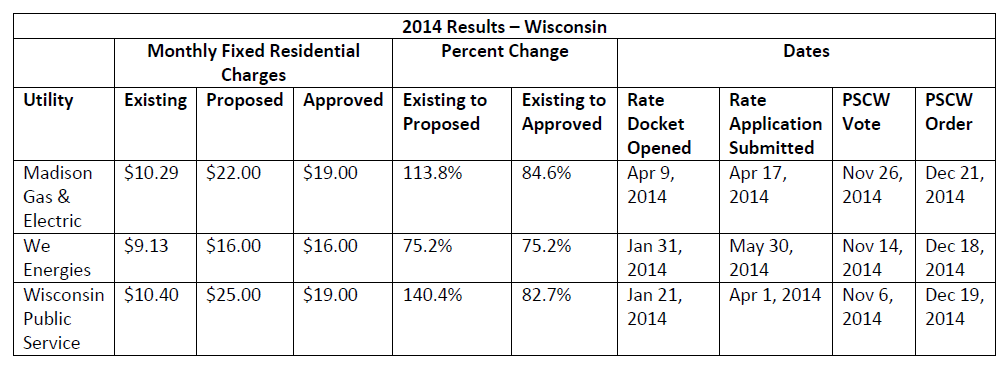Nine Times More Meetings with Utility Lobbyists Than Clean Energy Reps
 On the third floor of the Public Service Commission (PSC) headquarters in Madison, Wisconsin, directly across from the elevator, is the guard’s desk. There you’ll find the visitors sign-in log.
On the third floor of the Public Service Commission (PSC) headquarters in Madison, Wisconsin, directly across from the elevator, is the guard’s desk. There you’ll find the visitors sign-in log.
Our analysis of a 17-month period documents the Commission’s greater than 9-to-1 preference for meetings with lobbyists from Wisconsin’s major utilities and their supporters, including law firms, investment banks, and contractors, over representatives from clean energy organizations.
Although the Wisconsin PSC states on its website that its mission is to “ensure that safe, sufficient, and reasonably priced utility services are provided to all of Wisconsin’s customers,” the sign-ins show that the PSC is interacting overwhelmingly with powerful, entrenched interests. The world-wide clean energy revolution is being stymied in Wisconsin one meeting at a time.
 Who Met with Whom
Who Met with Whom
You can see the results for yourself: today, we are publishing HERE the names of the lobbyists and representatives we have identified, the commissioners or executive assistants they met with, as well as the times of those meetings. The list can be sorted by date, company, and participant names.* We’ve also embedded the actual registers 2014 and 2015 (click on each year) so you can see or print them.
Acting on a tip, we submitted a public records request to examine the logs for a 21-month period, from Jan. 1, 2014 through Oct. 2, 2015 (the date of our request). We received logs for just 17 months. When we asked why four months are missing, we were told they can’t be found.
Strength in Numbers
During this period, the register shows that there were at least 129 distinct meetings between utility-related lobbyists and commissioners and their powerful executive assistants. Only 14 meetings took place between commissioners and their executive assistants and lobbyists of clean energy organizations.
Another way to look at the data is to count the actual number of utility lobbyists that showed up for meetings at the Wisconsin PSC as opposed to clean energy lobbyists. If you examine the individual sign-ins for meetings, there were 149 lobbyist sign-ins from utility interests and only 20 lobbyist sign-ins from clean energy interests. That’s a ratio of 7.5-to-1.

WEC Energy Group
The largest and most powerful utility in Wisconsin is Milwaukee-based WEC Energy Group. That utility also takes the prize for the most meetings of any single organization with PSC leadership. In fact, WEC Energy Group’s Senior Vice President of External Affairs Bert Garvin, Vice President of State Regulatory Affairs James Schubilske, and Vice President of Consumer Services John Zaganczyk had at least 11 meetings with Wisconsin Public Service Commission commissioners and executive assistants at the Madison headquarters during this period.
Exemptions from Ex Parte Rules
Even today, when WEC Energy Group’s top lobbyists, Garvin and Schubilske, meet with a commissioner’s executive assistant, no one is ever required to be informed of their conversations. That’s because, as we have written previously, executive assistants to commissioners are exempt from Ex Parte rules. No reporting of their conversations with lobbyists is required – although commissioners still must comply. These powerful staffers can talk at any time for as long as they want about anything they want and never have to inform other parties in a contested rate case. The question is what do they tell their bosses behind closed doors?
Monthly Solar Fee
On June 27, 2014, WEC Energy Group subsidiary We Energies proposed a fixed, monthly “standby charge” for residential solar customers as part of its rate case.
Such a policy is straight out of the Edison Electric Institute’s playbook. EEI is the national lobbying organization for the utility industry and appears to be driving opposition to residential solar nationwide. In an article titled “Getting Solar Pricing Right,” EEI encourages the use of regulatory tools to stifle the growth of rooftop solar by making the technology less economically viable. It states:
“The most straightforward regulatory approach is to require customers to pay for more of the grid services they use through a higher monthly customer charge and to simplify the tiered rate structure. Increasing the monthly customer charge significantly reduces the NEM [Net Energy Metering] subsidy… The time to change net metering is now and regulatory tools are available to do so.”
Wisconsin PSC’s Open Arms
As a group, utilities in Wisconsin have been very successful in getting monthly fees increased and approved. Here’s a chart of how it rolled out in 2014:

In 2015, the success of the approach of increasing fixed charges continued:

Meanwhile, rural cooperatives, not subject to oversight by the Wisconsin PSC, have been approving solar projects. And on Oct. 30, 2015, a Dane County Judge ruled that the Commission did not have enough evidence to back up its decision to impose monthly fees on residential solar, and overturned part of the We Energies monthly fee. But while upper Midwest states are rapidly increasing their output of wind energy, Wisconsin hasn’t built a new wind farm in five years.
Overall, the PSC continues to be an impediment to the development of solar, wind and energy efficiency programs. Now that we have the data, the question is why is the Wisconsin Public Service Commission’s favoritism so profound?
Scott Peterson is executive director of Checks and Balances Project, a national watchdog blog that seeks to hold government officials, lobbyists and corporate management accountable to the public. Funding for C&BP comes from pro-clean energy philanthropies and donors.
Read more:
Wisconsin Public Service Commission: Slow-Walking Accountability?
Wisconsin Public Service Commission Ex Parte Rules Gutted
Wisconsin’s Strange Case of the Missing Job Description
* About Our Methodology
We obtained the Wisconsin Public Service Commission’s visitor logs via an open records request. You can view it HERE. We noted instances of individuals meeting with PSC Commissioners Ellen Nowak, Phillip Montgomery, Mike Huebsch, and Eric Callisto and/or their executive assistants Delanie Breuer, Bob Seitz, R.J. Pirlot, Jennifer Esser, Teresa Hatchell, and Nate Zolik. We also noted instances of visitors who signed in and met with Commissioners in general.
We further narrowed the list of visitors to those who explicitly indicated that they were affiliated with either utilities or clean energy interests. Through additional web research and interviews, we further classified visitors whose representation was not initially apparent. Sign-in logs are, obviously, not as definitive as calendars. If you have corrections or information to share, please send us an email to [email protected].






Recent Comments